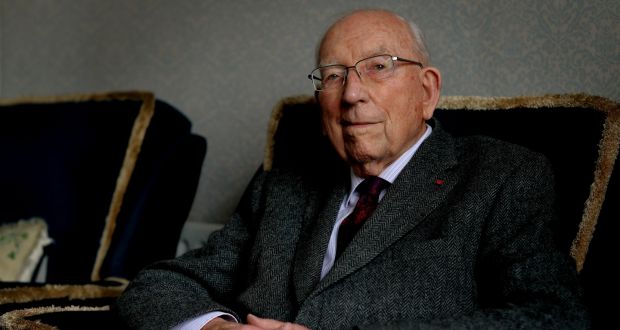Echoes of the past from the Archives
In 1964, a confidential report by the Irish Ambassador to the Holy See suggested to the Department of Finance that the Vatican Bank would think Ireland “too poor a country” for the bank to consider investing in.
On July 9, 1965, Kenneth Whitaker, the Secretary of the Department of Finance since 1955, wrote a letter marked “confidential” to Dr Donal O’Sullivan, the assistant secretary in the Department of External Affairs. He wanted help in sounding out a proposal that had been mooted.
“The suggestion has been made that the Vatican, which has large investments both in Italy and abroad, might be prepared to consider investments in Irish Government securities or in property development here. If this were so, it would provide considerable relief for us at the present time when we are short of capital, and, because the autonomous capital inflow has fallen, have to consider rather reluctantly the possibility of direct foreign borrowing in order to be able to sustain our economic advance.”
He was asking if the Irish Ambassador to the Holy See could be requested to make discreet enquiries into the possibility. If the response was encouraging the approach would be put on a more formal basis. But it was essential, however, that the initial approach did not “provoke a reference to the nuncio here.”
It would be time enough later to take those who would have to know into their confidence.
Postscript
O’Sullivan then wrote to Thomas V. Commins, the ambassador at the Vatican, adding in a hand-written postscript the suggestion that “you make it known that, in view of the rapid development which has been taking place in the economy, the Govt. is now in a position to consider external borrowing on a significant scale. This is regarded as preferable to realisation of part of our substantial external assets, which amount to £240million.”
Nothing better illustrates the more recent developments since 1965 in the Irish economy than the small size of these assets.
In Rome the ambassador made enquires and reported back to the departments in Dublin in a “highly confidential” memorandum on July 30. He spoke of the great secrecy that surrounds all activities in the Vatican.
There were three Vatican institutions involved in financial affairs, the third of which, the Instituto per le Opera di Religione, “operates in practice as a commercial bank” through which the other two conducted certain transactions.
His main source of information was a layman, Commendatore Luigi Mennini, a delegato of the Instituto per le Opera de Religione. “My go-between is a highly placed, highly competent and highly discreet member of the Vatican Court, who is also a director of the Banco Commerciale Italiana.”
(In the local parlance, Mennini was – though the ambassador did not add this – an “uomini di fiducia”, a man of confidence, in the Vatican.)
The ambassador gave Dublin a full account of the bank, but his conclusion was discouraging. The Vatican investment policy (at that date, at least) was inspired by considerations of profit and security.
“In principle, the Vatican are disinclined to considering operations in small or ‘poor’ countries – within which definition Ireland would, of course, fall. Even so, however, the Holy See, according to Menneni, does in fact have some such holding in Ireland though the amount is very small. But even in a country such as Belgium they are conducting no such operations. Neither do they now operate on the French exchange because of the almost built-in uncertainties there in the matter of internal political intervention.”
Investment
Much of their investment was either within Italy, where they could control it – 49% of Alitalia, for instance – or in large-scale Italian operations abroad, such as the construction company then building the Kariba Dam.
“From his soundings, my go-between formed the distinct impression that Ireland was not a place the Vatican investment administration would in principle be looking to for the purpose of investment.”
Ireland would simply not provide for the sort of total control that the Vatican Bank liked to have. Ireland had few attractions to the Vatican as a place to make money.
With the collapse of Banco Ambrosiano and the death (perhaps murder) of Roberto Calvi in June 1982, Luigi Mennini remained one of those under investigation, along with the American Cardinal Paul Marcinkus.
A warrant for their arrest was issued by the Italian police in 1987, but thrown out by the courts because the Vatican Bank was beyond Italian interference. Mennini died in 1995 aged 86.
Scandal
Scandal enveloped the Vatican Bank in those years, and still does. Last month, the Australian Cardinal Pell, recently appointed by Pope Francis to oversee the Vatican finances, found millions tucked away in secret off-balance sheet accounts.
The Vatican Bank is reported to have assets of €8 billion. The finances of the Vatican may be healthy, but full transparency has yet to be achieved. Three individuals have been charged by a Vatican prosecutor with corruption.
Despite Dr Whitaker’s enthusiasm for the idea, perhaps Ireland in 1965 had a close call over Vatican investment in Ireland.


 Peter Costello
Peter Costello Dr. TK Whitaker.
Dr. TK Whitaker. 